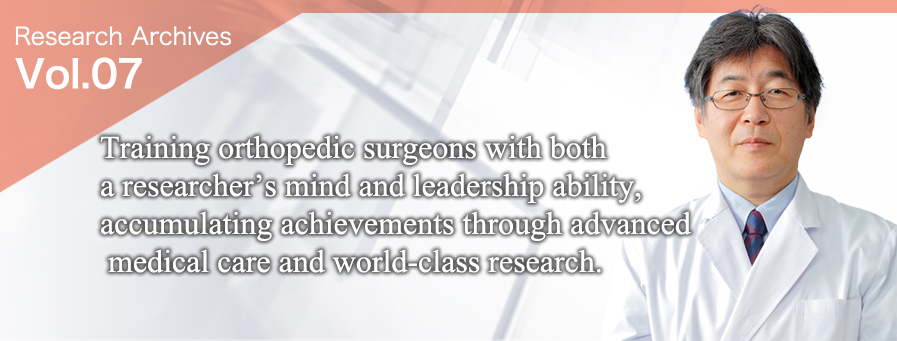
Department of Orthopedic Surgery, Graduate School of Medicine, Hokkaido University
Norimasa Iwasaki, M.D., Ph.D.Specialized
Medicine
- 1988: Graduated from the Department of Medicine, Asahikawa Medical University, and entered the Department of Orthopedic Surgery, Hokkaido University School of Medicine.
- 1994: Entered the Doctoral course of surgery, Department of Medical Research at Hokkaido University Graduate School of Medicine
From April 1994 to August 1995: Studied in the Department of Orthopedic surgery, Johns Hopkins University. - 1998: Completed a Doctoral Course of surgery Department of Medical Research, at Hokkaido University Graduate School of Medicine
- 2000: Became assistant professor, lecturer, and associate professor of the Department of Orthopedic Surgery
- 2012: Current post as a chairman of the Department of Orthopedic Surgery
Department of Orthopedic Surgery, Hokkaido University Graduate School of Medicine with History and Tradition Conducting various research aiming at clinical application.
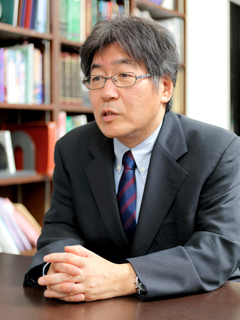
The Department of Orthopedic surgery at Hokkaido University Graduate School of Medicine is a department with a proud history and tradition, even in Japan. Many professors have passed through the University doors over the years, and most major core hospitals in Hokkaido are related to our department. Employment following internship and sub-special training courses are promising, and places to practice their expertise gained at the University are provided.
In the Department of Orthopedic Surgery headed by Prof. Iwasaki, the students can enter to graduate school after their third year training program, and can perform advanced medical research under an enhanced guidance system. Research is largely divided into the clinical research department and basic research department. In the clinical research department, clinical study is promoted based on abundant cases and previous achievements, while providing the medical care of the highest level by six teams, namely upper extremities, lower extremities, hip joint, spine, tumor, and sports medicine. In the basic research department, research projects focus on bone and cartilage cellular and molecular biology, biomechanics, biochemistry, pharmacology, and tissue engineering.
"I always carry out research with the view of clinical application. I feel that filling in areas which are lacking in clinical practice, working on a theme to actively connect a new treatment method, and aiming for clinical development is important, even in basic research."
Prof. Iwasaki has personally been involved in various research projects on tissue engineering of the musculoskeletal system and glycobiological studies. He has successfully developed biomaterial (Scaffold) from highly purified naturally-derived materials, and a cartilage regeneration treatment, which applies this new material. In 2014, a cartilage repair drug, which takes advantage of seaweed-derived algin acid, was jointly developed with a pharmaceutical company, and was adopted as a Next Generation Technology Program (NexTEP) by the Japan Science and Technology Agency (JST).
Moreover, in clinical research of the upper extremities, Prof. Iwasaki has worked on the development of the first artificial hand joint in Japan, and the research achievement has been applied in clinical use. He carried out the investigator initiated clinical trial with the support from the Hokkaido Organization for Translational Research has also been carried out (October 2009 – June 2014).
Achieving a high level in all areas of education, medical care, and research.
Human resources who can take the lead in orthopedic treatment in Hokkaido are trained.
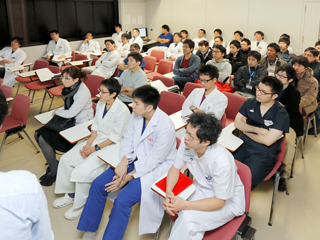 The Department of Orthopedic Surgery handles various diseases related to the musculoskeletal system including bone, cartilage, muscles, tendons, ligaments, nerves, and blood vessels, and provides a wide-range of treatment from conservative treatment to surgery. In recent years, the role and importance of the department has further increased due to a progressively aging society, the spread of sports, and the high demand to improve the Quality of Life (QOL).
The Department of Orthopedic Surgery handles various diseases related to the musculoskeletal system including bone, cartilage, muscles, tendons, ligaments, nerves, and blood vessels, and provides a wide-range of treatment from conservative treatment to surgery. In recent years, the role and importance of the department has further increased due to a progressively aging society, the spread of sports, and the high demand to improve the Quality of Life (QOL).
"Needs in orthopedic care and research, are expected to increase in the future. We still have much to do. From this viewpoint, orthopedic surgery is a very attractive field. One characteristic of this department is that clinical application of research achievement is comparatively feasible. For example, the only medical treatments for tissue regeneration currently covered by the national health insurance are those for cartilage and skin. Regeneration of cartilage is actively performed worldwide. Regeneration of cartilage is in high demand by patients, and it is a region where application to the patient is relatively easy. As a result, development of new technology directly connected to clinical use is further expected.
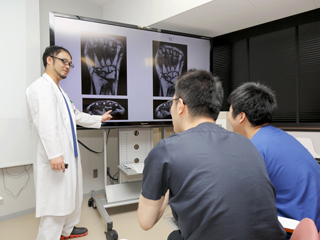 In the Department of Orthopedic Surgery, Prof. Iwasaki seeks to train superior clinical physicians and researchers, as persons who can play a central role in orthopedic care and research in Hokkaido, through 1) high quality education in both clinical practice and research, 2) a network of affiliated hospitals to provide advanced medical care while supporting local medical care in Hokkaido, and 3) an enhanced research environment within and outside the university. The Department of Orthopedic Surgery also contributes to sports medicine by provision of team doctors for professional sports teams in Hokkaido.
In the Department of Orthopedic Surgery, Prof. Iwasaki seeks to train superior clinical physicians and researchers, as persons who can play a central role in orthopedic care and research in Hokkaido, through 1) high quality education in both clinical practice and research, 2) a network of affiliated hospitals to provide advanced medical care while supporting local medical care in Hokkaido, and 3) an enhanced research environment within and outside the university. The Department of Orthopedic Surgery also contributes to sports medicine by provision of team doctors for professional sports teams in Hokkaido.
"By thoroughly conducting research for 4 years and accumulating achievements including an English thesis, we train a person to become an orthopedic physician with high ability, as well as a researcher, and as a result, a person can become an orthopedic physician with both a researcher's mind and leadership ability. Hokkaido University Orthopaedic Department provides a unique environment where medical doctors can be deeply involved in both superior clinical practice and world level research.
"PhD students of the orthopedic research laboratory spend time collaborating with the researchers of different fields. In addition those from the School of Medicine, the door is opened to students from other faculties, universities, and overseas schools, so all persons interested in the orthopaedic field and wish to branch out into new fields, are welcome to enter this graduate school.
(Interviewed in December 2014)
Stimulating the minds of young researchers through seminars and lectures to share the latest information
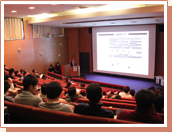 In the Department of Orthopedic Surgery, seminars, which invite lecturers from within and outside the university, are held several times a year. These seminars contribute to strengthening the motivation of young researchers by sharing a wide range of information such as the current condition and prospects of orthopedic surgery, medical accident prevention, and sport medicine. Moreover, workshops to introduce research and the training program into the classroom for students are held four times in a year.
In the Department of Orthopedic Surgery, seminars, which invite lecturers from within and outside the university, are held several times a year. These seminars contribute to strengthening the motivation of young researchers by sharing a wide range of information such as the current condition and prospects of orthopedic surgery, medical accident prevention, and sport medicine. Moreover, workshops to introduce research and the training program into the classroom for students are held four times in a year.


